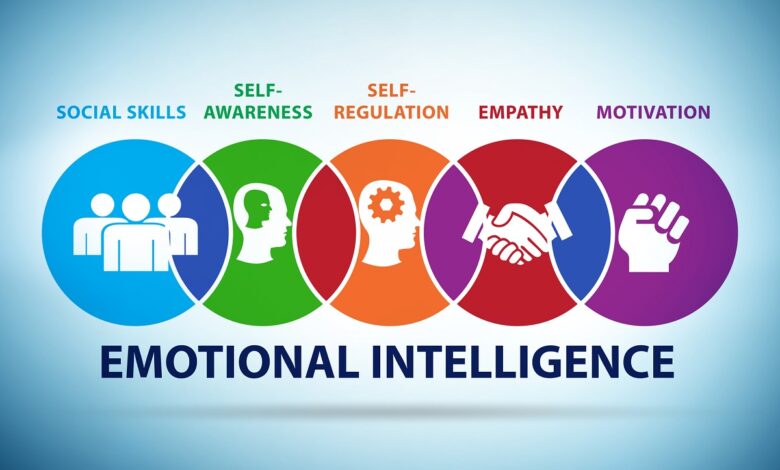The Science Behind Emotivci: Understanding and Harnessing the Power of Emotions
The Science Behind Emotivci: Understanding and Harnessing the Power of Emotions

What is emotional intelligence?

Emotional intelligence is the ability to recognize, understand, and manage our emotions, as well as the emotions of others. This concept has gained remarkable recognition in recent years, as it has been shown to be a crucial factor in personal and professional success. Emotivci takes a revolutionary approach, going beyond the surface and exploring the intricate channels of emotional intelligence that unfold within us.
Emotional intelligence includes a range of skills, such as self-awareness, empathy, and the ability to regulate our emotions. These skills help us navigate our relationships with others, make better decisions, and cope with stress. People with high emotional intelligence tend to be more successful in their personal and professional lives.
Why is emotional intelligence important?
Emotional intelligence is essential because it enables us to understand ourselves and others better. By recognizing and regulating our emotions, we can communicate more effectively, build stronger relationships, and make better decisions. In personal relationships, emotional intelligence can help us create deeper connections with our loved ones and resolve conflicts more effectively. In the workplace, emotional intelligence can help us work more collaboratively, lead teams more effectively, and navigate difficult situations with ease.
The benefits of emotional intelligence in personal relationships
Emotional intelligence is essential for healthy relationships. When we are emotionally intelligent, we can communicate our feelings effectively and understand the emotions of others. This helps us build stronger connections with our loved ones, resolve conflicts more effectively, and navigate challenging situations with ease.
People with high emotional intelligence are better able to manage their own emotions, which can help them avoid behaviors that might damage their relationships. They are also more skilled at regulating the emotions of others, which can help them create an environment of trust and understanding.
The benefits of emotional intelligence in the workplace
Emotional intelligence is also essential in the workplace. When we are emotionally intelligent, we can communicate more effectively, work more collaboratively, and navigate difficult situations with ease. This can help us build stronger relationships with our colleagues, lead teams more effectively, and achieve our goals more efficiently.
People with high emotional intelligence tend to be more successful in their careers. They are better able to manage stress, make better decisions, and adapt to changing circumstances. They are also more skilled at managing their own emotions and the emotions of others, which can help them navigate challenging situations with ease.
Developing emotional intelligence skills
Emotional intelligence is a skill that can be developed with practice. There are many strategies that can help us become more emotionally intelligent, such as mindfulness, self-reflection, and empathy training.
One way to develop emotional intelligence is to practice mindfulness. Mindfulness involves paying attention to the present moment without judgment. This can help us become more aware of our thoughts and emotions, which can help us regulate them more effectively.
Another way to develop emotional intelligence is to engage in self-reflection. Self-reflection involves taking time to think about our thoughts, feelings, and behaviors. This can help us become more aware of our emotional patterns and develop strategies to regulate our emotions more effectively.
Empathy training is also an effective way to develop emotional intelligence. Empathy involves understanding the emotions of others and being able to respond to them in a compassionate way. By practicing empathy, we can build stronger relationships with others and communicate more effectively.
Strategies for improving emotional intelligence
There are many strategies that can help us improve our emotional intelligence. One effective strategy is to practice active listening. Active listening involves paying close attention to what others are saying and responding in a way that shows that we understand their perspective. This can help us build stronger relationships with others and communicate more effectively.
Another strategy for improving emotional intelligence is to practice emotional regulation. Emotional regulation involves identifying our own emotions and responding to them in a way that is healthy and productive. This can help us avoid behaviors that might damage our relationships and achieve our goals more effectively.
Finally, practicing empathy is an effective way to improve emotional intelligence. By understanding the emotions of others and responding to them in a compassionate way, we can build stronger relationships and communicate more effectively.
The role of emotional intelligence in leadership
Emotional intelligence is essential for effective leadership. Leaders who are emotionally intelligent are better able to communicate their vision, motivate their team, and navigate difficult situations with ease. They are also more skilled at building strong relationships with their team members, which can lead to better performance and increased job satisfaction.
Leaders who are emotionally intelligent are also better able to manage stress and adapt to changing circumstances. This can help them make better decisions and achieve their goals more effectively.
Emotional intelligence and self-awareness
Self-awareness is a crucial component of emotional intelligence. When we are self-aware, we are better able to recognize our own emotions and respond to them in a way that is healthy and productive. This can help us avoid behaviors that might damage our relationships and achieve our goals more effectively.
Self-awareness also helps us understand our strengths and weaknesses, which can help us make better decisions and achieve our goals more effectively. By understanding our own emotions, we can also become more empathetic and build stronger relationships with others.
Emotional intelligence and empathy
Empathy is another crucial component of emotional intelligence. When we are empathetic, we are better able to understand the emotions of others and respond to them in a compassionate way. This can help us build stronger relationships with others and communicate more effectively.
Empathy also helps us navigate difficult situations with ease. By understanding the emotions of others, we can respond in a way that is productive and compassionate, which can help us achieve our goals more effectively.
Conclusion: Embracing the power of emotional intelligence
In conclusion, emotional intelligence is a crucial factor in personal and professional success. By recognizing and regulating our emotions, we can communicate more effectively, build stronger relationships, and make better decisions. Developing emotional intelligence skills, such as mindfulness, self-reflection, and empathy training, can help us become more emotionally intelligent and achieve our goals more effectively. So, embrace the power of emotional intelligence and unlock the secrets of Emotivci, where emotions hold the key to unlocking personal growth and success.




Thanks for sharing. I read many of your blog posts, cool, your blog is very good.